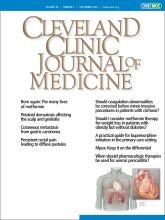To the Editor: In previous publications, we presented evidence that 25-dehydroxyvitamin D (25[OH]D) in serum behaves as a negative acute-phase reactant, ie, that its concentration decreases in the presence of inflammatory states.1,2 Low levels may thus reflect low vitamin D stores or inflammation, complicating the clinical interpretation of test results.
We have recently become aware of the mechanism underlying this phenomenon: less than 1% of circulating 25(OH)D exists in unbound form, and the majority is tightly bound to vitamin D binding protein, while 10% to 15% is bound to albumin. Both are negative acute-phase proteins.3–5 As the serum concentrations of these proteins decrease, so does that of 25(OH)D. Similarly, the positive acute-phase behavior of copper is explained by the fact that it is bound to ceruloplasmin, a positive acute-phase protein.6
- Copyright © 2023 The Cleveland Clinic Foundation. All Rights Reserved.






